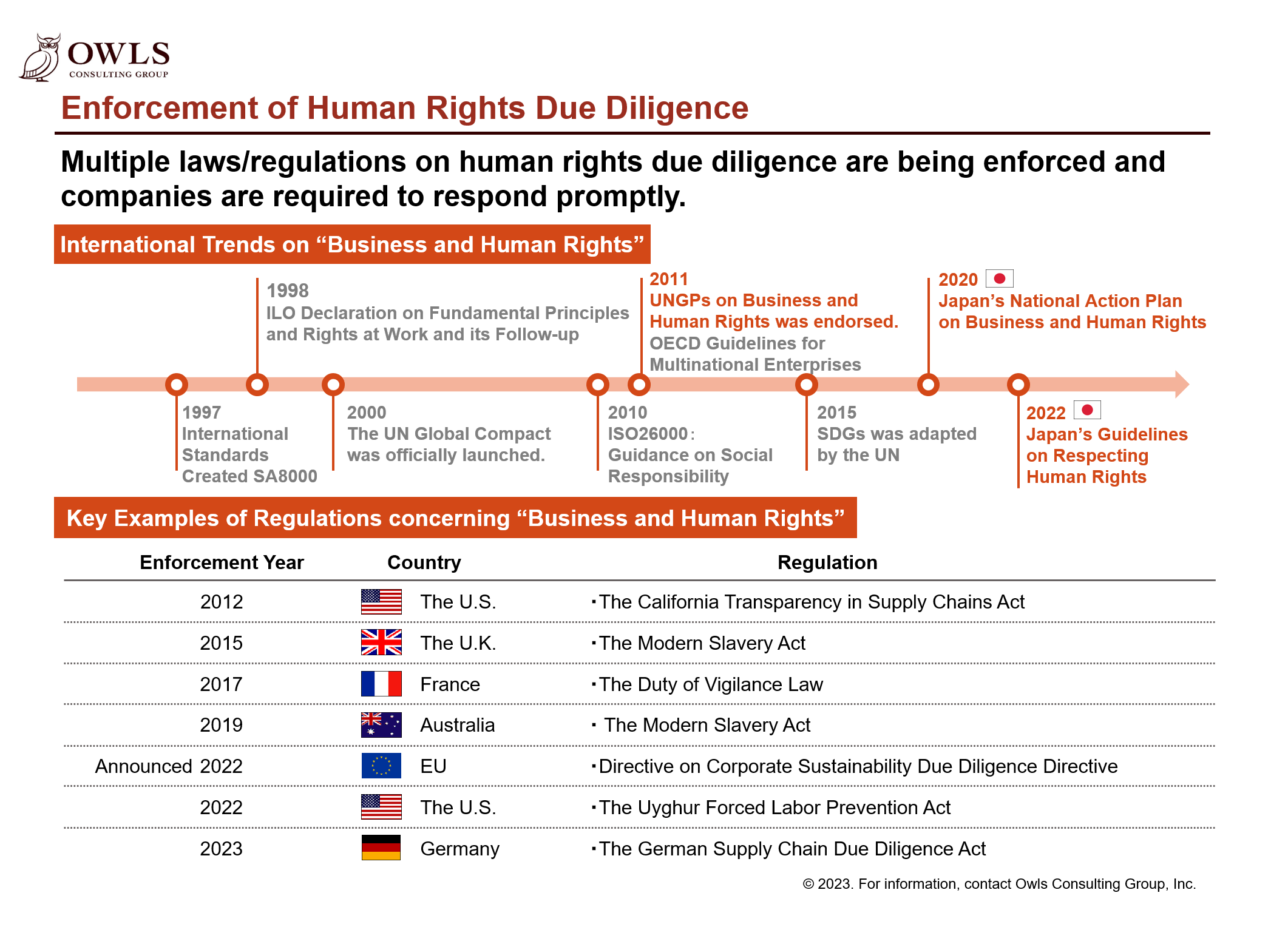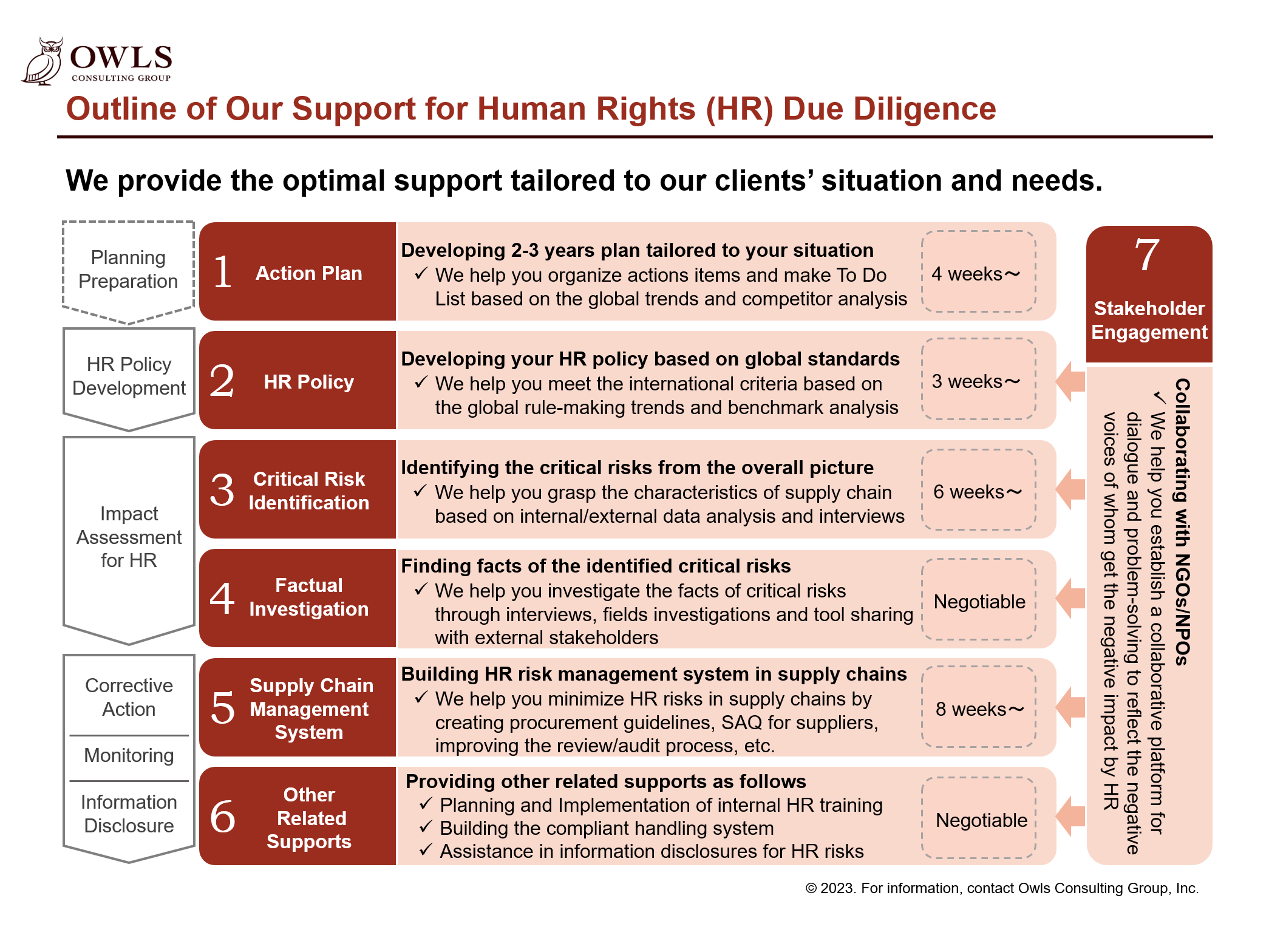Human Rights Policy and Due Diligence
<Examples of how we help our clients>
- Human rights risk assessment based on characteristics of the clients’ business & supply chain
- Human rights due diligence throughout the supply chain
- Internal and external training on “business and human rights”
The Global Demand for Human Rights
Since the Guiding Principles on Business and Human Rights (UNGPs) were adopted by the United Nations in 2011, there has been increasing pressure on companies to consider human rights in their supply chains. The UNGPs identify “the corporate responsibility to respect Human Rights” as one of the three pillars of the UNGPs, which requires companies to address not only human rights abuses that they directly cause, but also abuses that they contribute to or are directly linked to.(e.g., forced labor within supplier chains).
In response to this, in recent years, there has been an accelerating legislative and societal movement, mainly in Europe and the U.S., to require companies to conduct “human rights due diligence” (i.e., to identify risks of human rights violations associated with their business activities and take measures to prevent or mitigate them), which has also had an impact on Japanese companies operating in the region.
In addition, in February 2022, the EU announced the draft of Corporate Sustainability Due Diligence (CSDD) Directive, which will make human rights and environmental due diligence mandatory. The CSDD Directive will impose an obligation on companies in Europe, with a turnover or number of employees exceeding a certain level, to prevent and reduce negative impacts on human rights and the environment through their business activities. After CSDD comes into effect, EU member states will be obliged to legislate it in their own countries.
In response to this, in recent years, there has been an accelerating legislative and societal movement, mainly in Europe and the U.S., to require companies to conduct “human rights due diligence” (i.e., to identify risks of human rights violations associated with their business activities and take measures to prevent or mitigate them), which has also had an impact on Japanese companies operating in the region.
In addition, in February 2022, the EU announced the draft of Corporate Sustainability Due Diligence (CSDD) Directive, which will make human rights and environmental due diligence mandatory. The CSDD Directive will impose an obligation on companies in Europe, with a turnover or number of employees exceeding a certain level, to prevent and reduce negative impacts on human rights and the environment through their business activities. After CSDD comes into effect, EU member states will be obliged to legislate it in their own countries.
In response to these international trends, the Japanese government published the “Guidelines on Respecting Human Rights in Responsible Supply Chains” in September 2022. Based on this guideline, METI issued “Reference Material on Practical Approaches for Business Enterprises to Respect Human Rights in Responsible Supply Chains” in April 2023. We provided various information and materials in the process of preparing these papers. (For our report, please click here.)
In response to these actions taken by the governments and the international communities, Japanese companies are required to respond promptly to take the actions regarding Human Rights.
In response to these actions taken by the governments and the international communities, Japanese companies are required to respond promptly to take the actions regarding Human Rights.

Our Approach
We have assisted numerous major global companies in the past to conduct human rights due diligence and most of our consultants have completed the SA8000 basic trainer course, which is the international certification standards for social accountability that encourages organizations to develop, maintain and apply socially acceptable practices in the workplace.
Based on our profound knowledge and expertise, we provide the comprehensive support for the client’s action towards human rights.
Based on our profound knowledge and expertise, we provide the comprehensive support for the client’s action towards human rights.

Why OWLS?
1. Expertise in “Strategy” × “Human Rights & Sustainability”
We can bring both business and social sector perspective into our consulting support.
- As strategy consultants, many of our consultants have experience in global strategic consulting firms and have profound understanding of corporate strategy, business strategy, and supply chains. We help you develop the realistic and effective strategy that are not just armchair theories.
- As human rights & sustainability consultants, many of our consultants completed the SA8000 and several of them have worked with NGOs/NPOs (e.g., Fair Trade Label Japan, Ethical Association, Grameen Japan) as board members or executive directors which enable us to bring the social sector perspective.
Our CEO, Keisuke Hanyuda, has profound experience in supporting the policy making in the topic of “business and human rights”.
Our team has also provided support and discussions to other ministries (e.g., Ministry of Justice, Ministry of Agriculture, Forestry and Fisheries, etc.) on the same topic.
Our team has also provided support and discussions to other ministries (e.g., Ministry of Justice, Ministry of Agriculture, Forestry and Fisheries, etc.) on the same topic.

2. Leading numerous projects on “Business and Human Rights”
We have assisted a wide range of industries including manufacturing (transportation, electronics, industrial machinery, consumer goods, apparel, food, etc.), infrastructure and IT/media.
Major Projects’ Themes (Human Rights)
- Human rights action planning
- Human rights policy development
- Human rights due diligence (identification and assessment of adhere human rights risks)
- Internal/group/supplier training
- Development of training content (video + handbook)
- Discussion with board members and directors
- Compliance with the law for the elimination of discrimination against persons with disabilities
- Development of procurement guidelines including human rights and sustainability perspective
3. High Reliability in “Business and Human Rights”
We are the leading consultancy in business and human rights in Japan and have numerous media coverage including the seminars sponsored by METI, events and the media interviews taken by the economical Japanese newspapers and TVs.
4. Extensive Partnership with NGOs/NPOs
We are the only consulting firm in Japan with an extensive network in the social sector, working closely with many NGOs/NPOs. We initiate cross-sectoral collaborations with companies wishing to create a dialogue with the non-profit sector and the organizations.
Our Partners (Excerption)
-
- Certified NPO Fairtrade Labels Japan
(Maiko Shiozaki, Manager, serves as Executive Director) - Certified NPO ACE
(Keisuke Hanyuda, CEO, serves as a board member) - Ethical Association of Japan
(Keisuke Hanyuda, CEO, and Asuna Okubo, Principal, serve as directors) - GRAMMEN NIPPON
(Keisuke Hanyuda, CEO, serves as an advisor) - NPO LEGIKA
(Ayumi Yamori, Principal, serves as a board member) - Welcome Japan
(Keisuke Hanyuda, CEO, serves as an advisor) - NPO WELgee
(Cooperation through co-sponsoring seminars, corporate donations, etc.) - NPO Information Gap Buster
(Cooperation through corporate donations, etc.) - NPO Nichigoe Tomoiki Support Group
(Cooperation through corporate donations, etc.) - NPO Migiwa
(Cooperation through corporate donation, etc.)
- Certified NPO Fairtrade Labels Japan

Our Reports
- Explanatory Notes for “Reference Material on Practical Approaches for Business Enterprises to Respect Human Rights in Responsible Supply Chains” (April 2023)
- Further Strengthening of U.S. Trade Measures Related to Human Rights (Written by our Principal, Junichi Sugawara, May 2023, JBpress)
- Corporate Sustainability Strategy for Winning in the Steadily Expanding Fair Trade Market (Written by our social PR specialist, Lisa Wakabayashi, May 2023, JBpress)
- Government Fills the Moat to Eliminate Human Rights Violations in the Supply Chain (Written by our principal, Ayumi Yamori, April 2023, JBpress)
- Current Status and Challenges of the Food Industry regarding to “Business and Human Rights” (Written by our principal, Ayumi Yamori, November 2022, Food Industry of Tomorrow)
- Brief Report on “11th UN Forum on Business and Human Rights”: The Next Decade of “Business and Human Rights” to be Taken Together with Rights Holders (Written by our social PR specialist, Lisa Wakabayashi, November 2022, JBpress)
- Government Needs to Support to Realize the Change of Business and Consumers (Written by our principal, Asuna Okubo, November 2022, The Senken Shimbun)
- International Rule Making Trends on “Business and Human Rights” (Written by our principal, Ayumi Yamori, December 2022, Monthly Isos)
- Pathways for Sustainable Public Procurement Progress and Requests to Companies (Written by our manager, Mari Ishii, March 2023, Monthly Isos)
- ACE and OWLS’ Challenge to Eliminate Child Labor – Toward a “Do the Right Thing and You’ll Profit” System (Written by our CEO, Keisuke Hanyuda, July 2021)
- New Rules Are Making in Human Rights (Written by our manager, Mari Ishii, February 2019, Monthly Isos)
- “Human Rights Market” and Its Growing Trends that Japanese Companies Cannot Ignore (Written by our CEO, Keisuke Hanyuda, and our manager, Mari Ishii, October 2017, Gendai Business)
- Possibility of Losing 100 billion Yen by Disregarding of Human Rights (Written by our CEO, Keisuke Hanyuda, and our manager, Mari Ishii, October 2017, Gendai Business)




